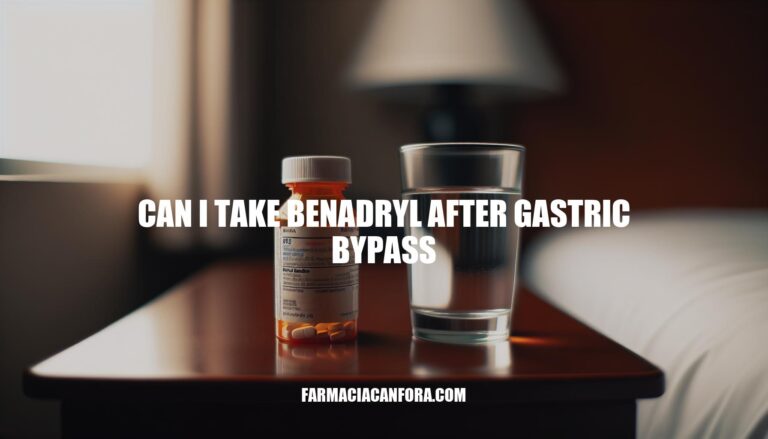


After gastric bypass surgery, understanding medication use is crucial due to changes in the digestive system. Medications like Benadryl (diphenhydramine) may have altered absorption and effects. Consulting healthcare providers ensures safe and effective treatment, preventing complications and ensuring optimal recovery.
Gastric bypass surgery, specifically the Roux-en-Y procedure, involves creating a small pouch at the top of the stomach and connecting it directly to the small intestine, bypassing a large part of the stomach and the upper portion of the small intestine (duodenum) . This significantly reduces the stomach’s capacity and alters the digestive process.
These changes necessitate careful management of medication types and dosages post-surgery to ensure effectiveness and avoid adverse effects.
Benadryl is a brand name for diphenhydramine, an antihistamine. It’s commonly used to relieve symptoms of allergies, such as itching, runny nose, and sneezing. It can also be used to treat motion sickness, induce sleep, and alleviate symptoms of the common cold.
After gastric bypass surgery, someone might consider taking Benadryl to manage nausea and vomiting, which are common post-surgery complications. Additionally, it can help reduce itching caused by prescription pain medications. However, it’s important to consult with a healthcare provider before taking any medication post-surgery due to potential changes in drug absorption and sensitivity.
Taking Benadryl (diphenhydramine) after gastric bypass surgery can pose several risks and side effects due to the altered digestion and absorption processes:
Altered Absorption: Gastric bypass surgery reduces the size of the stomach and alters the digestive tract, which can affect how medications are absorbed. This can lead to either reduced effectiveness or increased side effects of Benadryl.
Increased Sensitivity: The smaller stomach pouch and changes in the small intestine can make patients more sensitive to medications. This means that even standard doses of Benadryl might cause more pronounced side effects.
Common Side Effects: Benadryl can cause dizziness, drowsiness, dry mouth, constipation, and upset stomach. These side effects might be more intense post-surgery due to the body’s altered ability to process the medication.
Risk of Ulcers: Patients who have undergone gastric bypass are at a higher risk for developing ulcers. While Benadryl is not an NSAID (which are known to increase ulcer risk), any medication that irritates the stomach lining should be used cautiously.
Dehydration: Benadryl can cause dry mouth and throat, which might contribute to dehydration. Post-surgery patients need to be particularly careful about maintaining hydration.
It’s crucial to consult with a healthcare provider before taking Benadryl or any new medication after gastric bypass surgery to ensure it’s safe and to adjust the dosage if necessary.
After gastric bypass surgery, the use of Benadryl (diphenhydramine) should be approached with caution. Here are the general recommendations:
Absorption Issues: Gastric bypass surgery alters the digestive system, which can affect how medications are absorbed. This means that the effectiveness of Benadryl might be reduced.
Formulation: It’s recommended to avoid extended-release or enteric-coated formulations of medications, including Benadryl, as these may not be absorbed properly.
Side Effects: Patients should be aware of potential side effects such as drowsiness, which can be more pronounced due to changes in drug metabolism post-surgery.
Consult Healthcare Providers: Always consult with a healthcare provider before taking Benadryl or any new medication after gastric bypass surgery to ensure it is safe and appropriate for your specific situation.
If you have any specific concerns or symptoms, it’s best to discuss them with your doctor.
For patients who have undergone gastric bypass surgery, here are some alternative medications and treatments that might be safer or more effective:
Pain Management:
Nutritional Supplements:
Digestive Health:
Medication Formulations:
After gastric bypass surgery, it is crucial to understand how medications like Benadryl (diphenhydramine) interact with the altered digestive system. The reduced stomach size and bypassed duodenum can affect medication absorption and tolerance, leading to potential complications.
Consulting a healthcare provider ensures safe and effective treatment. They can help manage medication types and dosages post-surgery to prevent adverse effects.
Benadryl is commonly used for allergies, motion sickness, and sleep aid but may pose risks after gastric bypass surgery due to altered digestion and absorption processes. Patients should be aware of potential side effects such as drowsiness, dry mouth, constipation, and upset stomach, which can be more intense post-surgery.
Dehydration is also a risk, especially with medications that cause dry mouth and throat. To ensure safe use, patients should consult their healthcare provider before taking Benadryl or any new medication after gastric bypass surgery. They may recommend alternative medications or treatments, such as:
By working closely with a healthcare provider, patients can minimize risks and achieve optimal recovery.